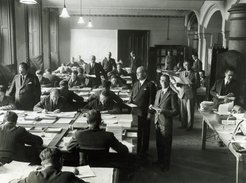Administrating Feelings

Feeling the State: The Emotional Styles of the French Bureaucracy
Francesco Buscemi
Modern political institutions not only include parliaments and presidents, but also, less conspicuously, public administration and the law. Contrary to current opinion, both are heavily imbued with emotions. The post-revolutionary French bureaucracy encouraged its civil servants to develop particular kinds of feelings in order to be considered good republicans and loyal servants to the sovereign state.
While the absolute monarchy and Napoleon invented the political skeleton of what is now the French Fifth Republic, the real life of the state institutions was moulded by the changing emotions of those who worked in and for them, and by visible tensions between different emotional scripts and practices for and of public servants. Synchronized civic oaths and civic certificates attest that all state employees were supposed to share the same political faith during the French Revolution. The design and goals of two different National Schools of Administration, one founded in 1848 and one in 1945 show how different regimes nurtured the political emotions that were considered a requirement for bureaucratic service.
Feeling the Law: The Emotional Styles of International Criminal Jurisdiction
Agnes Arndt
International criminal jurisdiction describes itself as strictly neutral, unpolitical, and unemotional, yet at the same time it faces the challenge of reconciling globally differing feelings about what constitutes justice and how it should be administered. An analysis of this dynamic in cases of genocide, war crimes, crimes against humanity, and aggression, illustrates the emergence and development of international criminal jurisdiction as a political institution, looking at three pivotal case studies: the Trials of War Criminals before the Nuremberg Military Tribunals, The International Criminal Tribunal for the former Yugoslavia, and the International Criminal Court. Not only did emotions shape the initial discussions that led to the establishment of an international criminal jurisdiction, but the emergence of these courts was a reaction to individually and collectively articulated emotions, which they continue to template and politicize today.
